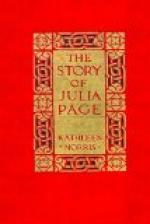Emeline had aged in seven years; she looked hopelessly removed from youth and beauty now, but later in the day, when her hair would be taken out of its crimping kids, her sallow cheeks touched with rouge, and her veined neck covered by a high collar, a coral chain, and an ostrich-feather ruff, some traces of her former good looks might be visible. She still affected tight corsets, high heels, enormous hats. But Emeline’s interest in her own appearance was secondary now to her fierce pride and faith in Julia’s beauty. Drifting along the line of least resistance, asking only to be comfortable and to have a good time, Emeline had come to a bitter attitude of resentment toward George, toward the fate that had “forced” her to leave him. Now she began lazily to fasten upon Julia as the means of gratifying those hopes and ambitions that were vain for herself. Julia was beautiful, Julia would be a great success, and some day would repay her mother for the sacrifices she had made for her child.
Emeline dressed, went about, flirted, and gossiped still; she liked cocktails and cards and restaurant dinners; she was an authority on all things theatrical; her favourite pose was that of the martyred mother. “All I have left,” Emeline would say, kissing her daughter effectively, before strangers. “And only God knows what it has cost me to keep my girlie with me!”
Julia would grin good-naturedly at this. She had no hallucinations about her mother. She knew her own value, knew she was pretty, and was glad with the simple and pathetic complacence of fourteen. Julia at eight had gone to dancing school, in the briefest skirts ever seen on a small girl, and the dirtiest white silk stockings. She had sung a shrill little song, and danced a little dance at a public benefit for the widows of three heroic firemen, when she was only nine. Her lovely mop had been crimped out of all natural wave; her youthful digestion menaced by candy and chewing gum; her naturally rather sober and pensive disposition completely altered, or at least eclipsed. Julia could chatter of the stage, could give a pert answer to whoever accosted her, could tell a dressmaker exactly how she wanted a gown made, at twelve. While her mother slept in the morning, before the girl learned to sleep late, too, the child would get up and slip out. Her playground was O’Farrell Street, dry and hot in summer, wrapped in soft fog four mornings a week the year round, reeking of stale beer, and echoing to the rattle of cable cars. The little Julia flitted about everywhere: watching janitors as they hosed down the sidewalks outside the saloons, or rinsed cuspidors; watching grocers set out their big signs for the day; watching little restaurants open, and first comers sit down to great cups of coffee and plates of hot cakes. Perhaps the sight of food would remind the little girl of her own empty stomach; she would straggle home just as the first sunshine was piercing the fog, and loiter upstairs, and peep into the bedroom to see what the chances of a meal might be.




